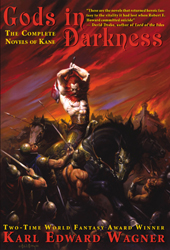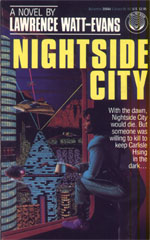 When Karl Edward Wagner began writing his Kane stories in 1970 he inherited the legacy of the barbarian hero from Robert E. Howard. Howard had almost single-handedly created sword-and-sorcery with his works, but Wagner – in creating his character of Kane – not only went back to the roots which had been planted by Conan and Kull (as so many other pale imitators had done), but also infused those roots with the rich traditions of fantasy and horror which had blossomed in the forty years since Howard had died.
When Karl Edward Wagner began writing his Kane stories in 1970 he inherited the legacy of the barbarian hero from Robert E. Howard. Howard had almost single-handedly created sword-and-sorcery with his works, but Wagner – in creating his character of Kane – not only went back to the roots which had been planted by Conan and Kull (as so many other pale imitators had done), but also infused those roots with the rich traditions of fantasy and horror which had blossomed in the forty years since Howard had died.
Kane is one part Elric, one part Conan, but a creation all his own. His tales inherit the purity of Howard’s barbarism, but also reach back into Howard’s own influences to crank up the elements of Lovecraftian horror. You can feel the influences of Moorcock, Leiber, Moore, and Tolkien bubbling beneath the surface.
To this rich tradition, Wagner brought his own natural talent for the fantastical and the horrific, telling his stories with a brutal, beautiful prose.
Gods in Darkness, from Night Shade Books, is a collection of all three of Karl Edward Wagner’s Kane novels: Bloodstone, Dark Crusade, and Darkness Weaves. It has a sister volume, The Midnight Sun, which collects all of the Kane short stories.
BLOODSTONE
Unfortunately, the first novel in this collection is almost certainly the weakest. Perhaps the most persistent and grating problem here is Wagner’s infatuation with the thesaurus, coupled with an inordinate amount of obvious pleasure taken in finding the most obscure terms possible. The intention appears to an evocation of Lovecraftian prose, but the effect which Lovecraft so expertly crafts is rendered impotent through the sheer tenacity with which Wagner pursues it.
The plot, while strong in many regards, is conveyed in an episodic fashion – with many events relegated off-stage with description or narration. The effect, in later works, is to keep the action focused on the primary cast of characters – seeing their place and their reactions within a large world. In Bloodstone, however, the effect is disjointed and further weakened by the fact that most of the characters (with the exception of Kane himself) have strong taints of the cliché about them.
Coming to BloodstoneI had heard that Wagner was something of a hidden gem in the sword-and-sorcery genre: A writer whose talents compared favorably to Howard, Leiber, and Moorcock – but whose career had been cut tragically short by an early death. Reading Bloodstone, I was disappointed to discover an author of only mediocre skill.
DARK CRUSADE
Fortunately, the second novel in the collection is Dark Crusade, which should be on the reading list for any fan of sword-and-sorcery.
I don’t know if Bloodstone was just an early work which took its time getting into print, if Wagner was simply rushed or off his rhythm while writing it, or if Wagner had a major breakthrough between ’75 and ’76: Whatever the case may be, everything which was only nascent mediocrity in Bloodstone comes together in Dark Crusade to craft a top notch novel.
One of the interesting things to note about Kane is that, unlike his fellow heroes-in-arms, Kane frequently finds himself on the wrong side of a conflict. Conan finds a crown when he joins a just rebellion against a tyrannical king. Kane seeks empire, and frequently allies himself with any power which becomes convenient or available. He believes that he can overcome whatever flaws or corruption exist within the power base he takes advantage of, but finds – time and time again – that the flaws and corruption are inherent to the power. As a result, Kane often finds himself in a role which would be villainous if it were not for his own nature as an anti-hero: Often he destroys his own dreams in an attempt to purify them of a tarnish which cannot be removed.
It is this dark depth of contradiction and tragic flaw – a wisdom and strength coupled with folly and weakness – which makes the character of Kane so infinitely fascinating. Like all of the great sword-and-sorcery tales, it is not the plot of pulp adventure which makes the stories of Kane a compelling read: It is the careful drawing of their larger-than-life protagonist.
DARKNESS WEAVES
The third novel in Gods in Darkness is on the same playing field as the second. If anything, Darkness Weaves represents an improvement over the craft and skill which went into the telling of Dark Crusade. Notably, a more complex cast of characters is invested with more detail, drawn in more depth, and (as a result) given greater significance.
Ultimately, none of these novels impressed me with the quality of Howard’s The Hour of the Dragon or Leiber’s “Ill Met in Lankhmar”. But Dark Crusade and Darkness Weaves are both classics – and if I want to see more of the war in Dark Crusade and more of the twin romances in Darkness Weaves, that’s only a testament to the strength of what’s already on the page.
GRADES:
BLOODSTONE: C+
DARK CRUSADE: A-
DARKNESS WEAVES: A-
Karl Edward Wagner
Published: 2002 (1975/1976/1978)
Publisher: Night Shade Books
Cover Price: $35.00
ISBN: 1-892389-24-X
Buy Now!













